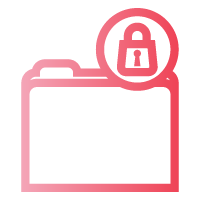Victim service providers help survivors of intimate partner violence attain safety and security after a crisis. But what if the process of helping a victim puts them in more danger?
Victim services software must prioritize security above all else to ensure survivors can move past their crises and receive the support they need. More than 12,000 teams of victim service providers in the United States alone must communicate and collaborate to identify clients’ needs and give them access to resources and services to improve their situation.
To guarantee that victims’ information reaches the right people — and never falls into hands that could cause more harm — organizations must be able to control vast networks of data with tiers of access while also prioritizing collaboration.
Below, we will identify five security measures every victim services team must have in place to ensure their clients’ safety and efficient delivery of services.


Secure, centralized data storage
Thanks to secure online data storage, confidential information is significantly easier to protect than in the days of paper files. Information stored online must meet rigorous regulatory standards due to its sensitive nature: medical, financial, and housing data are all protected by regulatory bodies like HIPAA, LIHEAP, and HUD, respectively. Service providers need to have access to this information, but it must be protected for the client’s personal safety and privacy.
Storing this data on private, well-maintained servers ensures that the data will always be available and, most importantly, safe.
Robust case note functionality
Different individuals and organizations can interpret data differently, so having access to the data alone could lead to conflicting or confusing conclusions. By having robust case notes attached to a client’s file, providers can communicate more clearly and effectively with one another about the data’s context and external factors.
When providers communicate with one another about a client’s needs, they can work together more efficiently and present a united front, granting the client peace of mind and confidence in the organization’s suggestions and services.


Bed management software
The first step in their healing journey for many survivors of abuse is having somewhere safe to go. Many VSPs can provide emergency placement for victims to protect victims and provide basic necessities, such as food and clothing. Victim services software is integral to successfully managing available resources, getting more help to more people.
Secure bed management software can allow organizations to track available and occupied beds across entire networks of local shelters, digitally linking beds to occupants and their case notes. VSPs can reserve beds at any connected shelters, and shelter staff can check the client in and out of the building, allowing shelters and service providers to know if and when the client is in a safe environment.
Secure referral system
Beyond their immediate needs and safety after being removed from an abusive situation, victims and survivors may require many forms of ongoing support, such as long-term housing, mental healthcare, or job training. VSPs’ referrals to these organizations contain confidential and sensitive information, such as medical, financial, or deeply personal data about their clients.
Victims’ data must be stored securely and shared via regulation-compliant channels. CaseWorthy allows organizations to grant access to only qualified individuals and providers by storing data in private, centralized servers. Organizations can even define groups or tiers of access, allowing certain individuals to see only data relevant to their qualifications and services.


Identification tools
For many organizations, private logins and passwords are enough to protect their work. But others may require higher levels of authentication, such as identification badges, barcodes, and signatures. Using victim services software that is able to meet stringent identification and authentication requirements can make the organization eligible for more collaborations and integrations — especially when dealing with legal and governmental entities.
When assisting victims of crimes and abuse, VSPs can benefit from robust and collaborative tools, but security should always be top of mind. An emphasis on security in a program’s work and mission builds trust within communities, networks, donors, and — most importantly — the clients they serve.

